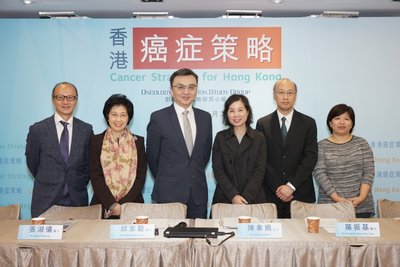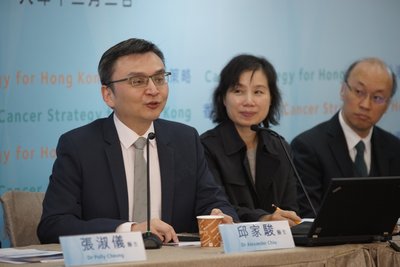HONG KONG, Dec. 3, 2016 /PRNewswire/ -- Healthcare professionals, NGOs, pharmaceutical industry, insurance companies, cancer patient groups and community leaders must join hands in the fight against the high burden of cancer in Hong Kong. "A people-centred cancer strategy based on a more integrated, and multi-disciplined model needs to be urgently introduced for better patient outcomes," said experts from the Oncology Innovation Study Group (OISG).


The Cancer Burden
Cancer ranks as the number one leading cause of death in Hong Kong, accounting for thirty percent or 13,803 of all registered deaths in 2014 - a significant increment of 17% compared to a decade ago. Further to this, new cancer cases have also been rising at 3.1 % per year over the past decade, reaching 29,618 in 2014.
OISG commissioned KPMG to conduct a study, Improving Patient Outcomes -- A Cancer Strategy for Hong Kong, to identify gaps along the WHO's framework of patient's pathway in five key areas from prevention, screening, diagnosis, treatment to palliative care. Hong Kong was benchmarked with six other countries/regions including the UK, Australia, Singapore, Taiwan, Sweden and France in this study.
Key Bottlenecks
Cancer patients face a complex journey once diagnosed. They visit multiple healthcare providers, specialty fields of testing, hospital units and organizations. They also see a multitude of physicians, radiologists, chemotherapy, nurses etc. An integrated approach to coordinate care and optimize resources is therefore urgently needed. One of the inevitable circumstances that cancer patients face today is the long waiting time from diagnosis to their first treatment.
Palliative care is also an instance in which earlier integration could benefit patients. "Research evidence has shown that with palliative care incorporated early, advanced cancer patients' pain and depression can be improved with better quality of life, and their quantity of life can be further extended too," said Dr Raymond Lo, an OISG Expert Panel Member.
Cancer patients need affordable access to cancer medicines in a timely manner. Yet, out of the 26 cancer medicine approved by the European Medicine Agency in 2003-14 and indicated for major cancers, patients in Hong Kong can only receive subsidies to one-third of them through public funding.
These facts and figures present a critical call for urgent attention to all stakeholders to jointly deliver more integrated cancer care in Hong Kong. "The public healthcare system in Hong Kong has been doing a great job in cancer care given the amount of resources allocated. Within the community, there are actually many other stakeholders that can contribute to speed things up and make cancer control a much more integrated public health strategy. Shorter waiting times, early integration of palliative care, timely and affordable access to cancer medicines are key issues to deliver better patient outcomes," said Dr Alexander Chiu, an OISG Expert Panel Member.
The Solution: A Modern People-Centred Cancer Strategy
"We know that a people-centred, modern cancer strategy is the solution for Hong Kong. We should educate the public on the importance of primary and secondary cancer prevention. Moreover, multi-stakeholders involvement along the patient's pathway is also critical for success," said Dr Polly Cheung, Founder of The Hong Kong Breast Cancer Foundation and a representative in the OISG Expert Panel.
Based on the report as well as WHO's people-centred healthcare framework, OISG recommends a set of three concrete implementations. First, a district-based cancer care system that will integrate multi-disciplinary cancer care services to enhance timely care, improve patients' quality of life and optimize resources. Second, to improve cancer drug access. This includes exploring additional financing approaches, further extension of the current risk-sharing scheme, the development of affordable private health insurance coverage and an accelerated drug enlistment process. And finally, to engage multi-stakeholders in offering people-centred healthcare for both patients and their family members from prevention, to screening, diagnosis, treatment and palliative care. [See Factsheet on OISG Recommendations.]
Better Outcomes
"Everything we recommend in speeding up the process and integrating multi-disciplinary professionals is to aim for a much better quality patient outcomes and quality of life. Private sectors such as pharmaceutical manufacturers and health insurers must work together with the government and NGOs in narrowing the gaps along the patients' pathway," said Ms Sabrina Chan, Executive Director of The Hong Kong Association of the Pharmaceutical Industry.
"Every day, around 40 cancer patients are dying and another 80 new cases are diagnosed. Every single second matters for them! We simply cannot wait any longer," said Dr C. K. Law, Specialist in Clinical Oncology, "Hong Kong needs to have an accelerated cancer control strategy that unites all stakeholders much closer, faster."
Experts from OISG will convene regularly with different stakeholders to communicate and explore ways to implement their recommendations for better patient outcomes.
Highlight of OISG Recommendations
[Please also see Factsheet of OISG Recommendations]
The Oncology Innovation Study Group recommends three implementation areas to improve the outcome of cancer care in Hong Kong.
1. Enhance Integration of Cancer Care Services
Adopt a people-centred approach in the design and development of cancer care facilities and services. To ensure cancer patients and their care givers receive comprehensive care throughout their journey, the report recommends the establishment district based integrated Cancer Care Centers with a hub-and-spoke model. In this model, patients could receive specialized care from an integrated oncology and palliative centre (the "hub"), and supportive care from other local HA hospitals, clinics and community centres (the "spoke"). In the development of this model, public-private partnership could be explored and implemented to optimize resources and expertise across different sectors.
To assist patients in navigating the system and transitioning through different stages of care, the report recommends a cancer case management (CCM) system to ensure the delivery of the right health care resources at the right time. CCM programmes have been piloted in various hospital clusters with promising results such as improved waiting time from diagnosis to first definitive treatment.
2. Enhance Accessibility of Cancer Medicine
Improve accessibility to and financing of cancer medicines while providing safeguards to ensure responsible use of funds. To alleviate the pressure public funding, the report recommends exploring other financing approaches such as charity sponsorship and private health insurance. Charities will be called for to work together in support of public health care initiatives including sponsoring pilot programmes to assess feasibility and long-term viability of new solutions. Private health insurers could play a more significant role in enabling sustainable model of cancer care financing.
A key challenge for them today is the inability to predict and control costs. To this end, private health insurance companies, government, pharmaceutical industry and hospital administrators should come together to improve data transparency and predictability to support further development of private health insurance programmes with more holistic cancer coverage.
OISG recommends further adoption of risk sharing agreements between healthcare payers and pharmaceutical manufacturers. In particular, performance-based risk sharing agreements linking enlistment and reimbursement levels to how a medicine is utilized or its effectiveness, thereby enabling payers to manage uncertainties regarding clinical value, performance and financial impact.
3. Engage Multi-Stakeholders Along the Patient's Pathway
Engage multi-stakeholders' involvement along the patient's pathway in five areas: prevention, screening, diagnosis, treatment and palliative care. OISG recommends the setting up of a multi-stakeholder platform, such as a cancer commission, that enables the collaboration of professionals from different industries to do research and development for a modern cancer strategy. These multi-stakeholders come from medical sector, academia, insurance companies, pharmaceutical industry, NGOs, public and private hospitals as well as medical social work.
The cancer commission can set key performance indicators for short and long terms against international standards.
Photo - http://photos.prnasia.com/prnh/20161203/8521607915-a
Photo - http://photos.prnasia.com/prnh/20161203/8521607915-b
Photo - http://photos.prnasia.com/prnh/20161203/8521607915-d